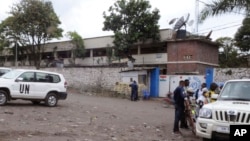Two of the most popular radio stations in Democratic Republic of Congo were jammed on Tuesday for the fourth day in a row, drawing criticism of the government from the United States and opposition groups.
Radio France Internationale (RFI) and the U.N.-funded Radio Okapi have been unavailable since the morning of November 5, hours before a banned protest against President Joseph Kabila's plan to stay in power beyond the end of his mandate this year.
According to the Central African country's constitution, Kabila is due to step down when his second mandate ends on December 19. His ruling coalition and some opposition members have agreed to delay the vote until April 2018, citing a lack of preparation, but the main opposition bloc rejects the accord.
U.S. "deeply troubled"
The United States said in a statement late on Monday it was "deeply troubled" by the radio signal outages, which it called a "government infringement on press freedoms and the Congolese people's access to information.”
"Press freedoms and the right to assemble peacefully are essential components of democracy," the statement added.
The government has not commented on the outages, which France has also called "unacceptable.”
RFI is often cut off during a protest but outages usually last only one day and it is rare for other stations to be affected.
Since Burkina Faso's long-ruling President Blaise Compaore was ousted in 2014 by mass protests against a bid to extend his mandate, African governments have occasionally shut off radio and internet during tense periods in order to quell opposition.
Protests turn violent
Georges Kapiamba, President of the Congolese Association for Access to Justice (ACAJ), said he hoped that Western authorities would add those responsible for the Congo outages to targeted sanctions lists.
"The signal cuts ... are additional proof that the Congolese government is following closely in the footsteps of Burundi and the international community should therefore take action," he said on Tuesday, referring to the east African country's violent repression of those opposed to Pierre Nkurunziza's third term.
Anti-Kabila protests in Congo have often turned violent and the United Nations says security forces killed at least 48 citizens during demonstrations in September.
The violence, and other signs that the opposition is being suppressed, prompted Washington to impose sanctions on a Congolese general and a former senior police official in September.
The European Union has also said it will prepare economic sanctions on Congo unless it holds its delayed presidential and parliamentary elections next year.









